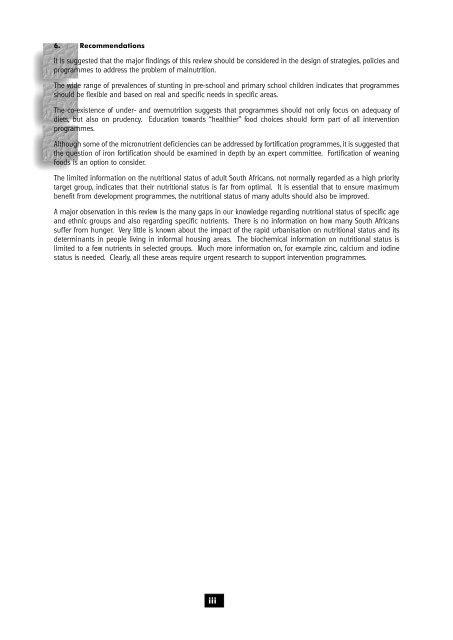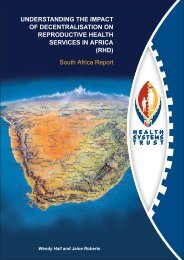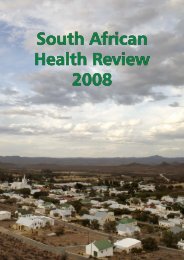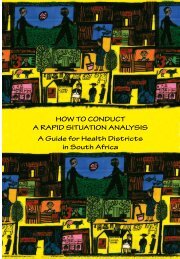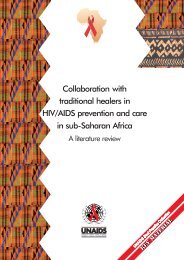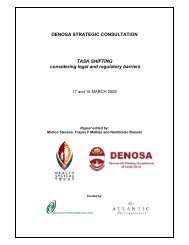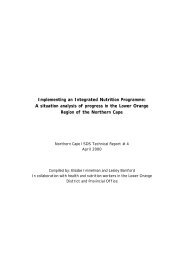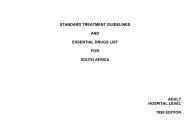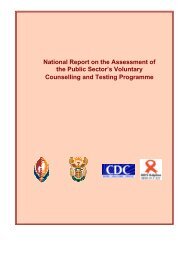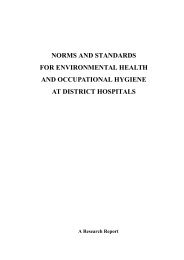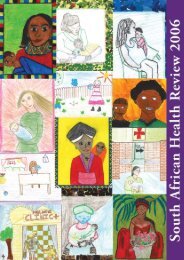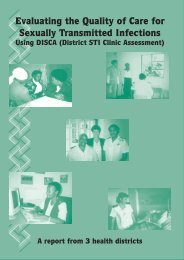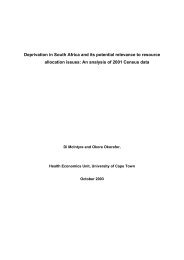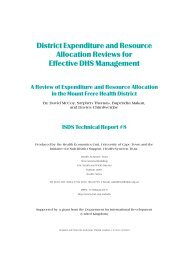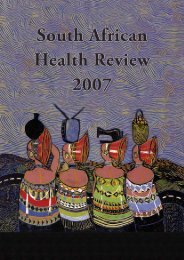the nutritional status of - Health Systems Trust
the nutritional status of - Health Systems Trust
the nutritional status of - Health Systems Trust
Create successful ePaper yourself
Turn your PDF publications into a flip-book with our unique Google optimized e-Paper software.
6. Recommendations<br />
It is suggested that <strong>the</strong> major findings <strong>of</strong> this review should be considered in <strong>the</strong> design <strong>of</strong> strategies, policies and<br />
programmes to address <strong>the</strong> problem <strong>of</strong> malnutrition.<br />
The wide range <strong>of</strong> prevalences <strong>of</strong> stunting in pre-school and primary school children indicates that programmes<br />
should be flexible and based on real and specific needs in specific areas.<br />
The co-existence <strong>of</strong> under- and overnutrition suggests that programmes should not only focus on adequacy <strong>of</strong><br />
diets, but also on prudency. Education towards “healthier” food choices should form part <strong>of</strong> all intervention<br />
programmes.<br />
Although some <strong>of</strong> <strong>the</strong> micronutrient deficiencies can be addressed by fortification programmes, it is suggested that<br />
<strong>the</strong> question <strong>of</strong> iron fortification should be examined in depth by an expert committee. Fortification <strong>of</strong> weaning<br />
foods is an option to consider.<br />
The limited information on <strong>the</strong> <strong>nutritional</strong> <strong>status</strong> <strong>of</strong> adult South Africans, not normally regarded as a high priority<br />
target group, indicates that <strong>the</strong>ir <strong>nutritional</strong> <strong>status</strong> is far from optimal. It is essential that to ensure maximum<br />
benefit from development programmes, <strong>the</strong> <strong>nutritional</strong> <strong>status</strong> <strong>of</strong> many adults should also be improved.<br />
A major observation in this review is <strong>the</strong> many gaps in our knowledge regarding <strong>nutritional</strong> <strong>status</strong> <strong>of</strong> specific age<br />
and ethnic groups and also regarding specific nutrients. There is no information on how many South Africans<br />
suffer from hunger. Very little is known about <strong>the</strong> impact <strong>of</strong> <strong>the</strong> rapid urbanisation on <strong>nutritional</strong> <strong>status</strong> and its<br />
determinants in people living in informal housing areas. The biochemical information on <strong>nutritional</strong> <strong>status</strong> is<br />
limited to a few nutrients in selected groups. Much more information on, for example zinc, calcium and iodine<br />
<strong>status</strong> is needed. Clearly, all <strong>the</strong>se areas require urgent research to support intervention programmes.<br />
iii


